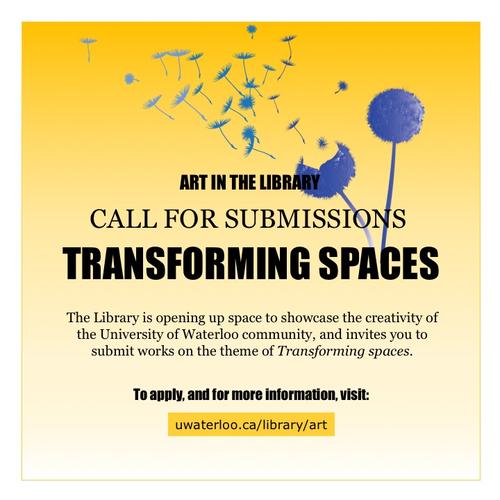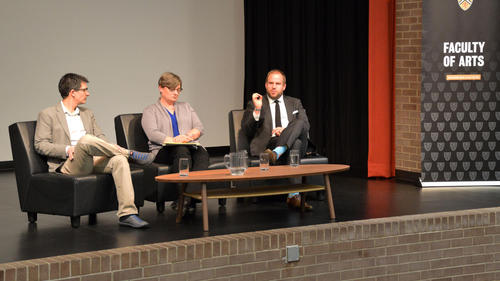The Daily Bulletin is published by Internal and Leadership Communications, part of University Communications
Contact us at bulletin@uwaterloo.ca
Submission guidelines
Editor:
Brandon Sweet
University Communications
bulletin@uwaterloo.ca
More than 70 departments were represented at the Workday Mini Town Hall, hosted by Human Resources on November 27. The event provided employees with an opportunity to learn more about training, resources, and support through the transition to the new HR system.
Kenton Needham, executive director, human resources began the Mini Town Hall by tying HR’s mission and vision into how Workday is designed to better serve employees. “You’re all customers – are you getting the services you deserve, and do we have the systems in place to be able to deliver those services to you?” he asked.
Partnering with Workday will allow HR to meet employees where they expect it, provide improved client service, implement better technology, and ensure that our systems align with Ontario employment legislation.
Needham also spoke about the support employees will receive after Workday launches in January. “When we say success is more than go-live, we don’t mean everything will work perfectly. What we mean is there will be on-going support during and after the system launches. There will be continual updates to the system and we will be offering additional functionality in future releases and looking for more ways we can improve our service to you.”
The panel of experts then addressed frequently asked questions from previous information sessions and questions submitted in advance before the discussion opened up to audience questions. Watch the Workday Mini Town Hall recording for the full presentation and Q&A discussion.
If you have any questions, please contact workday@uwaterloo.ca.
For more information, visit the Workday website.

A message from the Library.
Following two years of renovations at Dana Porter and Davis Centre libraries, the Library would like to open up library spaces to showcase the creativity of our community. The Library invites the University of Waterloo community to submit works on the theme of Transforming spaces.
Accepted works will be on display in the Davis Centre Library silent study room from January to August 2019, and will be featured on our website, social media pages and other publications. All members of the University of Waterloo community - students, staff, faculty and others - are welcome to participate.
Submissions must be received by Monday January 7, 2019.
Learn more about Art in the Library.

By Rose Simone. This is an excerpt of an article that was originally published on Waterloo Stories.
The power of artificial intelligence is already permeating throughout our work and social lives.
But as artificial intelligence (AI) systems “learn” from millions of interactions or case examples, it also has the potential to be disruptive, said experts from the University of Waterloo during a panel discussion on ‘Keeping the Human in AI’ at the Kitchener Public Library last week.
The professors with expertise in economics, philosophy, and human-computer interaction discussed the implications and how to mitigate against the dangers at the talk and during interviews.
Like the steam engine, electricity or semiconductors, AI is a “general purpose technology,” with far-reaching implications, says Joel Blit, a Waterloo economics professor who co-wrote a policy paper on Automation and the Future of Work for the Centre for International Governance Innovation.
“I absolutely think this is going to change the way our economy is organized, the way jobs are done and who gets what wages,” Blit says.
Along with the huge increase in computing power, our digital era also generates massive data sets that the AI systems learn from. These data sets are now being used to teach AI systems how to recognize faces, understand natural language, and even play chess. They can assess political inclinations from Facebook posts, spot criminals from faces in a crowd or guess a person’s emotional state from their facial expressions.
Blit says in many cases, the AI will automate certain tasks, but not completely replace the job. An AI can help spot a tumor on a radiology image, but human radiologists need to verify that diagnosis and consult with physicians about the results and treatment options.
But overall, as with any type of automation, it allows jobs to be done with fewer people. Blit points out that a new company that emerges on the AI landscape might generate billions of dollars in value and revenue, but only have 50 employees. That has already been true of a number of companies in the digital era, such as YouTube, Instagram and WhatsApp, all of which were sold for billions but only had handfuls of employees to share in that wealth.
In the long run, AI can improve efficiency and bring down costs of some types of services, which in turn can increase the demand for those services. Also, as with any technological revolution, new applications for the tools will be found that will create jobs, Blit says.
The problem is that there is a transition period, Blit adds. He gives the example of the Industrial Revolution that started around 1770 but it took about 50 years before overall wages started steadily rising.
But the bigger worry is the potential for economic disruption leading to greater inequality and political instability, Blit says.
He stresses the need for policies that encourage entrepreneurship and gear education toward fostering leadership, empathy, communication, creativity and critical thinking skills so that young people will be flexible and ready for the jobs that will still exist in the future.
Yet economic disruption is just one type of impact that AI will have. Other experts, such as Carla Fehr, a Waterloo feminist philosopher and the Wolfe Chair in Scientific and Technological Literacy, says it can also amplify prejudices and biases in a society.
Fehr says even though people think of machines as objective, the data sets that train AI systems can have built-in biases. “Human beings are really bad at recognizing their own biases,” she adds.
She gives the example of the work of Joy Buolamwini, an African-American computer scientist at the M.I.T. Media Lab who experienced the bias of facial recognition software firsthand.
The Arts Undergraduate Office will close at 2:00 p.m. today for a staff holiday celebration.
Finance, including Student Financial Services, will be closed on Monday, December 17 from 12:00 p.m to 1:30 p.m. for a special holiday event. If students have questions during that time, please email sfs@uwaterloo.ca or call ext. 38466.
The Engineering Undergraduate Office will be closed on Wednesday, December 19 from 11:30 a.m. to 2:30 p.m.
Whether you attended the President's Town Hall Meeting on November 21 in person, watched it online, or didn't attend the meeting, University Communications and the President's Office is interested in hearing your views on the meeting format and content.
The President's Town Hall Meeting survey is now open and will run until Friday, December 21.
Your feedback is important and will help enhance future President’s Town Hall meetings.
Holiday Luncheon Buffet at the University Club, Wednesday, November 28 to Friday, December 21, 11:30 a.m. to 2:00 p.m., University Club.
PhD Seminar featuring Cole Atlin, School of Environment, Resources and Sustainability (SERS), “Fostering Sustainability and Wellbeing in the Ring of Fire: Utilizing Next Generation Assessment with Indigenous Communities to Build Pathways,” Wednesday, December 12, 10:00 a.m., EV2-2021.
Guest Lecture featuring Professor Alison Marshall, Brandon University, "The doing and undoing of religion in the field: ethnographic approaches to religion and migration," Wednesday, December 12, 11:00 a.m., PAS 1055.
Waterloo Women's Wednesdays Holiday Party, Wednesday, December 12, 12:00 p.m. to 1:30 p.m., HH 334.
Holiday Dinner Buffet at the University Club, Wednesday, December 12, 5:00 p.m. to 8:00 p.m., University Club.
Alleviating Anxiety Seminar, Wednesday, December 12, 5;00 p.m., HS 2302.
Deadline to get "Fees Arranged", Thursday, December 13.
Physics and Astronomy Colloquium series, Bridging the commercialization divide: the relationship between research and innovation, Thursday, December 13, 4:00 p.m., PHY 150.
University Christmas Project – register to sponsor a family in need this Christmas, drop off wrapped and labelled gifts by Friday, December 14, Tatham Centre. To sponsor a family, contact Shannon Taylor, smtaylor@uwaterloo.ca.
President's Holiday Luncheon, Friday, December 14, 12:00 p.m., Federation Hall.
Retirement celebration for Jerry Hutten, Friday, December 14, 3:00 p.m. to 5:00 p.m., University Club.
WRITING WITH VISION: A toolkit for your manuscript, Monday, December 17, 8:30 a.m. to 4:30 p.m., OPT WLRC.
Retirement Reception for Linda Richards, Monday, December 17, 11:30 a.m. to 1:30 p.m., E7 2nd Floor Event Space. Please RSVP to Kari Griffiths.
Holiday Buffet Luncheon in Federation Hall, Tuesday, December 18, 12:00 p.m. to 2:00 p.m., Federation Hall.
Advent Jazz Vesper Service, Tuesday, December 18, 7:00 p.m., Conrad Grebel University College Chapel.
Portfolio & Project Management Community of Practice (PPM CoP) session, “Community of Practice: What is it and future direction,” Wednesday, December 19, 9:00 a.m. to 10:30 a.m., East Campus 5 (EC5), 1111.
Master of Business, Entrepreneurship and Technology webinar, Wednesday, December 19, 12:00 p.m. to 1:00 p.m.
UWRC Book Club, “The Steady Running of the Hour” by Justin Go, Wednesday, December 19, 12:00 p.m. to 1:00 p.m., LIB 407.
NEW - Retirement celebration for Elsa Woodhall, Thursday, December 20, 4:00 p.m., Book Store.
School of Pharmacy graduate studies seminar featuring Professor Heather Mair, Recreation and Leisure Studies, Friday, December 21, 11:00 a.m., PHR 1012.
On this week's list from the human resources department, viewable on the UWaterloo Talent Acquisition System (iCIMS):
Internal secondment opportunities:
Additionally, check out the Federated University and Affiliated Colleges Opportunities site for other opportunities.
The Daily Bulletin is published by Internal and Leadership Communications, part of University Communications
Contact us at bulletin@uwaterloo.ca
Submission guidelines
The University of Waterloo acknowledges that much of our work takes place on the traditional territory of the Neutral, Anishinaabeg, and Haudenosaunee peoples. Our main campus is situated on the Haldimand Tract, the land granted to the Six Nations that includes six miles on each side of the Grand River. Our active work toward reconciliation takes place across our campuses through research, learning, teaching, and community building, and is co-ordinated within the Office of Indigenous Relations.